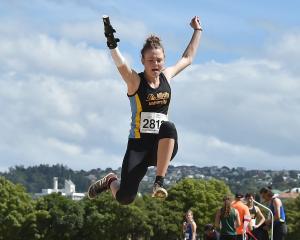
Highlanders win the 2015 Super Rugby final
It will never happen.
No way a franchise based in a backwater like Dunedin could put together a winning campaign in an international competition like Super Rugby.
Can’t be done. You’re dreaming.
Well, dream on Landers fans — it happened. The Highlanders edged the Chiefs 24-14 in the quarterfinal in Dunedin, dispatched the Waratahs 35-17 in Sydney and upset the Hurricanes 21-14 in the final in Wellington.
Still hard to believe in some ways.
Looking back, the class of 2015 had some very talented players. Aaron Smith had the best pass in the game and a growing tactical awareness.
Nasi Manu was a hard-working and under-rated No8.
Fellow loose forward Elliot Dixon scored one try and set up another in a man-of-the-match performance in the final.
Ben Smith was always threatening at fullback. Winger Waisaki Naholo scored 13 tries during the campaign.
Lima Sopoaga was the leading scorer and directed traffic well that season.
Malakai Fekitoa was a menace in the midfield.
But for all that the Hurricanes arguably had more talent with the likes of Ma’a Nonu, Conrad Smith, Nehe Milner-Skudder, Julian Savea, Beauden Barrett, TJ Perenara, Victor Vito, Ben Franks and Dane Coles.
Former Otago Daily Times rugby writer Steve Hepburn reckons the game came down to one big blown opportunity and some solid defence.
"The Highlanders took their chances and defended well," he said.
"Julian Savea dropped the ball with the line open with about 20 minutes to go. That is when you knew the Highlanders were going to win."

Hamish Bond drags the eight to Olympic gold
Is there a more singular, intense or focused athlete than Hamish Bond?
You have to half think it was his unbreakable will which actually powered the eight to victory at the Tokyo Olympics and not the oars of the men.
That is a lot of hyperbole and skinny on the facts but it has to be a factor in the eight’s rise.
Watching the big boat slice through the water and claim New Zealand’s first gold in the event since 1972 was rather magnificent.
Such an awesome display of raw power.
Supposedly they were always a chance. But for the casual observer the gold medal came out of nowhere.
The crew only qualified for the Olympics through a "last chance" regatta and advanced to the final via repechage.
Those are not the credentials of a strong favourite. And yet they stunned the rowing world.
They took control of the race at the halfway mark and had opened up an unassailable lead with 500m remaining.
Bond became the first New Zealander to stand on the top step of the podium in three successful Olympics.
He combined with Eric Murray to win gold in the coxless pair at the London (2012) and Rio Games (2016). Between Rio and Tokyo he reimagined his athletic career and won a Commonwealth Games bronze medal on a bike in 2018.
He is a phenomenal athlete and his presence in the second seat must have been like sticking a V8 in a Mini Cooper.
But it was probably his belief and not his power which made the biggest difference.
"We had shown potential throughout the year and started to believe more and more that we were capable of pulling it off," he told Sky Sport shortly afterwards.
"I knew that this week we really established a rhythm of how we want to row and we made a conscious decision early in the week, basically we were going to live by that rhythm or die by that rhythm."

Otago breaks Ranfurly Shield drought in 2013
How many of us got our photo taken with old Log o’ Wood that week. Everybody, right?
Perhaps that was down to panic. We all know the story.
Otago had waited 56 long years or 20, 418 days to win it back so the celebrations were fairly spirited.
Otago squad member Marshall Suckling took the madness further than most.
He shed his clothing to pose nude with it at the Remarkables.
But why not go a little mad.
Otago edged Waikato 26-19 on a Friday night in Hamilton in 2013.
The visitors showed some real grit on defence and some accurate goalkicking by Hayden Parker helped make the difference. He scored a try and slotted four penalties and two conversions.
Otago captain Paul Grant, whose grandfather Cliff Bisset played in the first Otago side to win the shield in 1935, summed up the mood.
"This is unreal. Most days just pass you by as a rugby player but this one I will always remember," he told the Otago Daily Times after the match.
Otago scored the decisive try midway through the second half from a 5m scrum.
Grant peeled off the back but was stopped short. But the ball came free for replacement loose forward TJ Ioane, who picked it up charged over. Waikato pressed hard in the final 10 minutes. But the Otago’s defence held.
For Otago assistant coach Phil Young it was a wonderful feeling. "For me, it has been so long as a player and as a coach. I never thought this day would come," Young said.
Nor did most of us.
That’s why we wanted the photo.
Otago has won it twice since but the breakthrough win was special. And we’ve got the snaps to prove it.












